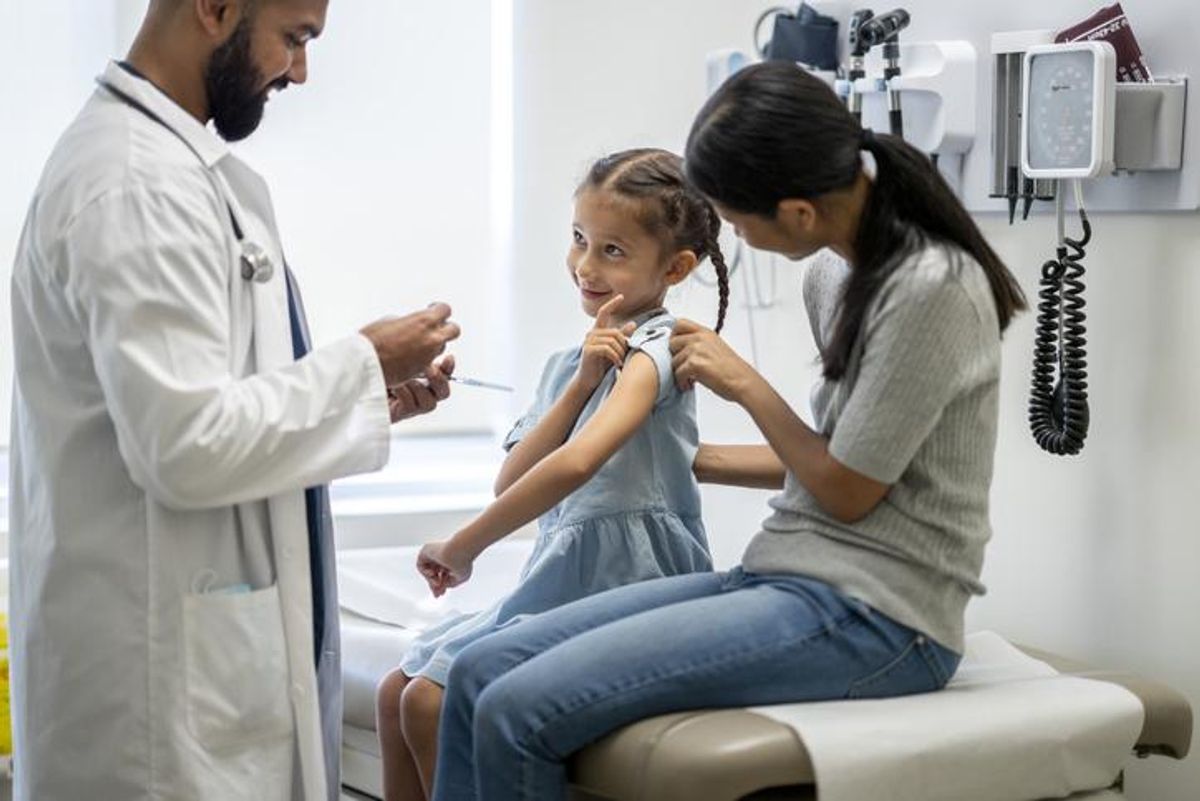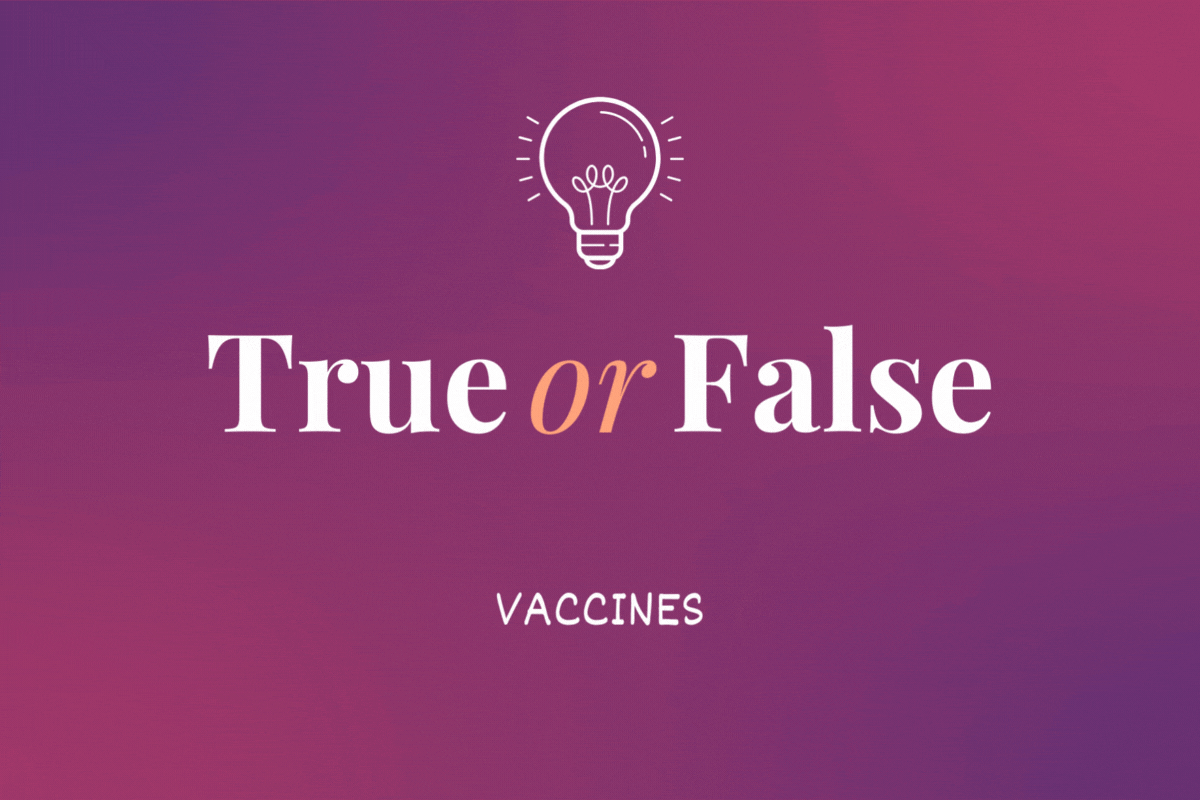Eleven years ago, Kristen O’Meara was hesitant to vaccinate her newborn daughter. “I was suspicious,” O’Meara recalled. “I did a lot of anxious hand-wringing.”
O’Meara, a special education director at a charter school in Chicago, said she began her online research with questions primed to turn up answers that reflected her bias. “I went in thinking, ‘Let’s find out how dangerous these really are.’ And, ‘What are they not telling me in the mainstream media?’” O’Meara said. “When you Google ‘Why are vaccines dangerous?’ down the rabbit hole you go.”
The answers O’Meara found online on websites and blogs written by conspiracy theorists threw fuel on her fears and seemed convincing enough to at least delay vaccinating her daughter and then, two years later, her twin girls. “I was never on a soapbox. I said, ‘Let’s shelve this. If there’s something terrible, we’ll think about it then,’” O’Meara said. “I can always vaccinate them later, but I can’t un-vaccinate them.”
But in the spring of 2015, when her daughters were 3 and 5 years old, later became too late. O’Meara’s household was struck by a severe, long-lasting stomach virus. Her pediatrician diagnosed them with rotavirus, an illness that can lead to dehydration, hospitalization and even death. There is no treatment for it — but there is a vaccine to help prevent it.
Thankfully, the family returned to health with no complications, but the experience shook O’Meara into reexamining her position on vaccines. She researched vaccines again, this time reading books by pediatrician and vaccine specialist Paul Offit and other immunology specialists. “I called my pediatrician and said, ‘OK. Put them on the catch-up schedule,’” O’Meara said. “Let’s just do this.’”
Jessica Peck, a clinical professor of nursing at Baylor University and immediate past president of the National Association of Pediatric Nurse Practitioners, has studied the psychological factors that influence vaccine beliefs and motivation. Peck said the reason for O’Meara’s viewpoint switch is one of the most powerful motivators for behavior change in healthcare decisions.
“People have to believe they are susceptible,” said Peck. “When people know they can be affected and the consequences will be severely impactful, they’re motivated to change their health behaviors.”
Peck said medical misinformation can look very credible online, but it’s important to be sure you’re using sites that don’t have a commercial bias. “The National Library of Medicine has a great tutorial on how to evaluate medical information to see if it’s credible or not,” she said.
Vaccines, said Peck, are approved only after being thoroughly tested in studies and then reviewed by the U.S. Food and Drug Administration (FDA), but the vaccination schedule is not set by the FDA. “Just because it’s FDA-approved doesn’t mean it’s routinely recommended for use in pediatrics,” said Peck. The Centers for Disease Control and Prevention (CDC) has an independent advisory board that reviews evidence from the clinical trials and the FDA to determine whether a vaccine should be routine or recommended for certain populations. Then major nonprofit health organizations, such as the American Academy of Pediatrics, choose whether to endorse them. These organizations, said Peck, have their own lengthy, multilayer review processes before recommending a vaccine for pediatric use.
“Science is an ethical profession,” Peck said. “We share what we know as we know it.”
But these past few years, because of the pandemic, so much is unknown.
According to Peck, the best source for information about vaccines is not what you read but whom you trust. “Talk to a primary care provider you trust and respect. Partner with them in decision-making.”
Today, O’Meara’s girls are vaccinated, but because of the pandemic, they are late getting their flu shots. “Getting to the doctor for routine things takes a back burner during a pandemic,” O’Meara said.
O’Meara is not alone. Immunization rates dropped as a result of the pandemic, said Peck, for many reasons. One was accessibility: Some pediatricians’ offices closed, as did school health centers. In addition, parents were afraid to go into the pediatrician’s office. Peck thinks kids were scared too, but for different reasons. “Our PPE made us look scary to kids,” Peck said. “And there was a restriction on visitors, so there was less support for patients.”
In addition to falling behind on vaccines because of care disruptions, parents fell behind on well-child examinations, which can create its own set of problems. “It’s so important to schedule those visits to keep babies up to date with their physical exams and make sure they’re meeting their developmental milestones,” Peck said.
Although immunization levels are bouncing back, Peck estimated it’s going to take about five years to catch up to pre-pandemic levels of immunization and overall child health and welfare.
“Vaccines,” said Peck, “are safe, reliable and a miracle of modern medicine.” The list of immunization’s successes is long. “They’ve eradicated polio. And before there was a vaccination for measles, there were half a million cases annually. One hundred children died from chickenpox every year,” Peck said.
“We know vaccines are the most effective way to prevent disease that can be debilitating or deadly.”
For a vaccine schedule for your child, check out the CDC’s recommended immunization schedule or contact your child’s healthcare provider.
This resource was created with support from Pfizer Inc.
- The FDA authorizes Pfizer's COVID-19 vaccine for children ages 5 to ... ›
- Lessons from how the polio vaccine went from the lab to the public ... ›
- Your child's vaccines: What you need to know about catching up ... ›
- Covid Vaccine Schedule for Children & Teens - HealthyWomen ›
- Top 5 Ways to Feel Empowered About Vaccine Decision-Making - HealthyWomen ›
- How Are Vaccines Made? - HealthyWomen ›
- The Dark Days Before Vaccines - HealthyWomen ›







